
Violence, climate change, rising poverty, and COVID-19 are forcing thousands of people from northern Central America, Haiti, and other places in crisis to flee their homes. Many, including unaccompanied children, have undertaken a dangerous journey to the United States southern border to ask for asylum.
Seeking asylum is legal under both domestic and international law—even during a pandemic. People arriving at the U.S. border have the right to request asylum without being criminalized, turned back to danger or separated from their families.
Leer en español: ¿Qué está pasando en la frontera sur de Estados Unidos?
After years of attacks on asylum seekers by the Trump Administration, the Biden Administration has taken key steps to ensure people fleeing violence and persecution can exercise their legal right to seek safety. However, more work is urgently needed to build a safe, orderly and humane asylum process.
Find out what’s happening, what the Biden Administration must do, and how you can help.
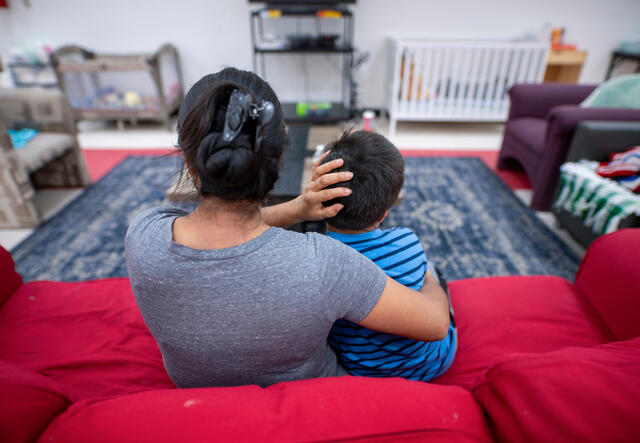
Who is crossing the U.S.-Mexico border?
Asylum seekers are people who ask for protection in another country because they fear violence or persecution in their home country. Many of the people attempting to reach safety by crossing the U.S.-Mexico border have no choice but to flee. They are women escaping gender-based violence, LGBTQ people fleeing persecution, and families and children seeking protection from gang violence.
A substantial number of asylum seekers are fleeing violence, persecution, and natural disasters in Haiti and the northern Central American countries of Guatemala, Honduras and El Salvador. Asylum seekers also come from Venezuela, Cuba, Brazil, India, and African countries, such as Eritrea, Ghana, Ethiopia and Cameroon. A small number of Ukrainians have crossed the border from Mexico to ask for asylum.
“People are usually displaced within their own countries first,” says Meghan Lopez, the IRC’s regional vice president for Latin America. “However, the vast majority encounter risks and deteriorating living conditions similar to the ones they fled, leaving them no choice but to seek safety elsewhere.”
Learn more about how the asylum system works.
Is seeking asylum legal during the COVID-19 pandemic?
Seeking asylum is always legal under both domestic and international law, including during a pandemic.
Epidemiologists and other public health experts have made clear that asylum seekers and their children can be safely processed at the border using public health measures. Even Chief Medical Officer to the President Dr. Anthony Fauci has said that immigrants are not the driving force behind the spread of COVID-19.
Turning asylum seekers away not only violates U.S. law, it sends people, including families with children, back to places where they face persecution and threats to their lives.
Is the Biden Administration allowing asylum seekers into the U.S.?
Despite established rights under U.S. and international law, people’s access to asylum was severely limited under the Trump Administration and many of the most severe policies continued well into the Biden Administration.
The Trump Administration used COVID-19 as a justification to immediately expel asylum seekers under a public health code called Title 42. After over a year of calls to end Title 42 from health officials and advocates, President Biden finally announced that the policy would be terminated in May of 2022.
One policy that still remains in effect is the Migrant Protection Protocols, or “Remain in Mexico." The administration initially halted the policy, which forced asylum seekers to wait out their cases in dangerous conditions in Mexico with little access to legal counsel. However, a court ordered the policy’s reinstatement. Unfortunately, while the Biden Administration is appealing the decision, they have restarted and expanded MPP.
The Biden Administration has also expanded immigration detention and is deporting Central American asylum seekers to unfamiliar areas of Mexico. Detention centers are notorious for inhumane conditions and woefully insufficient medical care, while expulsions and deportations further the spread of COVID-19. Due to systemic racism and rampant racial profiling, Black immigrants are at disproportionate risk of ICE detention and deportation.
“As conflict has escalated in recent months around the world, the U.S. honored [the right] to seek safety, offering alternatives for people from countries like Afghanistan and Ukraine,” said Olga Byrne. “But other crises cannot be neglected and the termination of Title 42 gives hope that asylum seekers from other parts of the world will have the same opportunity to search for safety in the U.S.
“The country’s asylum and refugee resettlement systems must provide viable pathways to safety for all people fleeing harm, regardless of their country of origin, race, religion, color or creed.”
Why are Haitians seeking asylum?
Haiti is facing political strife after the assasination of its president, a public health crisis with little to no infrastructure to mitigate the spread of COVID-19, and the near-constant onslaught of natural disasters. Last summer, Tropical Storm Grace hit Haiti just days after an earthquake devastated parts of the country and left over 2,000 people dead.
Effective in August, the Biden Administration announced that Haitians already in the U.S. would be eligible for temporary protected status, or TPS. TPS allows people from designated countries to live and work in the U.S. because their own country is suffering from armed conflict or natural disaster.
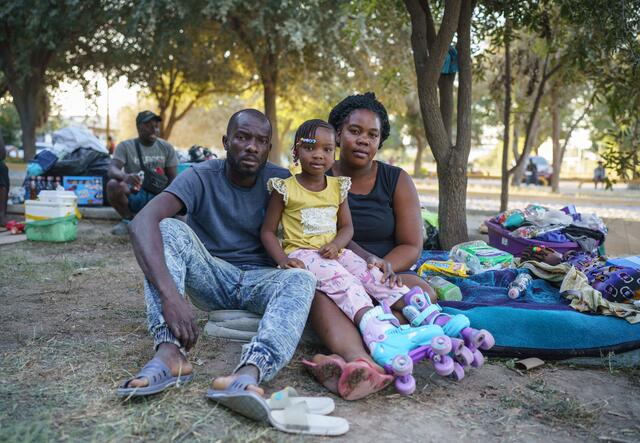
However, despite its recognition of Haiti’s crisis, the administration continues to turn away Haitian asylum seekers. U.S. Border Patrol were documented pursuing Haitian asylum-seekers on horseback armed with whips, abuse that is the direct result of an immigration system that criminalizes—rather than protects—people seeking safety.
The obstacles Haitians face on their way to safety start long before reaching the US-Mexico border. There have been reports of Mexican security forces being deployed to the South of the country--specifically in the state of Chiapas—to block the way of asylum seekers.
Why are people fleeing Central America?
People are facing worsening conditions in a region that has for years suffered from extreme poverty and some of the world’s highest murder rates outside of warzones.
In the final months of 2020, CuéntaNos, part of the International Rescue Committee's global information platform for refugees and migrants, saw a 1,500% increase in questions from Central Americans about immigration.
Why is this? First, the economic impacts of the COVID-19 pandemic have worsened conditions in the region, with an estimated 45.4 million people forced into poverty in 2020 alone. Struggling communities faced another blow in November when hurricanes Eta and Iota struck within three weeks of one another, leaving 3.4 million people in need of urgent assistance.
Gender-based violence is also pervasive in the region. Requests for women’s services and protection information doubled on CuéntaNos from October to November last year. Women and girls seeking safety are stuck in shelters filled beyond capacity with families who lost their homes to the hurricanes. Privacy is limited in these shelters and reports of sexual violence are on the rise.
All of these conditions are exacerbating the violence already plaguing the region.
“The hardest part about living in El Salvador is the violence,” says 23-year-old Valentina*, who fled to the U.S. after her family was threatened by gangs. “This is what makes life hard, because you leave your house and you don’t know if you’ll return. So, yes, this is a war.”
Honduras, considered the most dangerous country in the region, sees 38 murders per 100,000 people, even after a drop in homicides in recent years. A woman is murdered every 36 hours, mostly by an intimate partner.
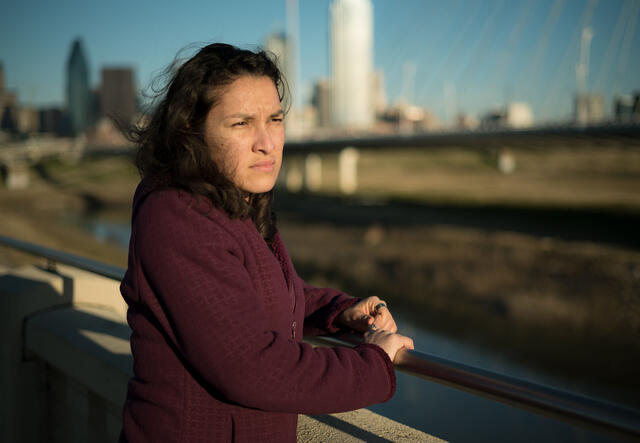
Why is there a problem with unaccompanied children crossing the border?
Like other asylum seekers, unaccompanied children are crossing the border to escape violence and persecution.
Escalating crises are forcing families to make impossible decisions and to send teenagers—or even young children—on a journey fraught with its own dangers, including human trafficking. Many of these children are trying to reunify with parents or other legal guardians already living in the U.S.
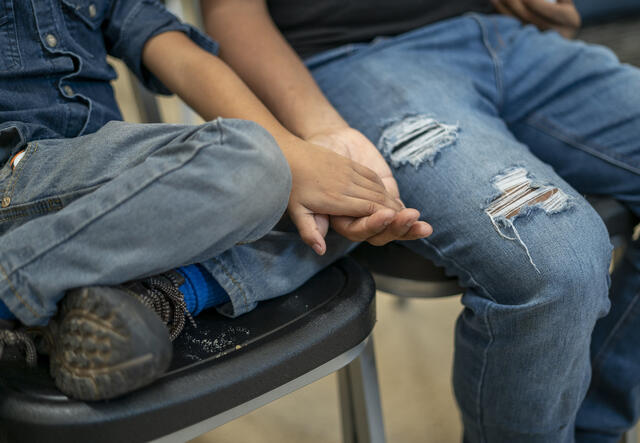
Why are more people asking for asylum now?
Worsening living conditions across Latin America and other regions, including those caused by the recent hurricanes and the earthquake that devastated Haiti, are contributing to an increase in the number of people who are forced to leave their homes to seek safety.

U.S. policy also plays a role: before leaving office, the previous administration unfairly and inhumanely barred asylum seekers by enforcing policies, such as family separation, that were often condemned by Americans.
The Biden Administration faces the challenge of unwinding the Trump Administration’s disastrous decisions. The U.S. must close this dark chapter in its history.
Watch an Instagram story on the situation at the U.S.-Mexico border and the IRC's work.
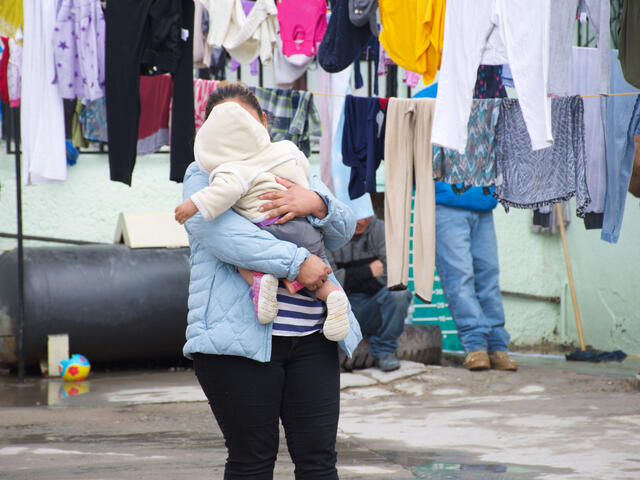
What should the Biden Administration do to help asylum seekers?
The U.S. has the resources and capability to treat asylum seekers with dignity. Here is what the Biden Administration should do:
- Urgently scale up partnerships with humanitarian organizations on both sides of the border that can meet the needs of asylum seekers.
- Immediately end expulsion flights to Haiti, stop expulsions of Haitians at the U.S. southern border and end immigration authorities’ use of violence against asylum seekers.
- Send more humanitarian aid to Central America, to address the crisis at its root and to protect and meet the basic needs of people undertaking the dangerous journey to the U.S.
- End Immigration and Customs Enforcement (ICE) detentions, expulsions, and deportations during the coronavirus pandemic.
Learn more about how the Biden Administration can create a humane asylum system.
What is the IRC doing to help?
The IRC provides critical support to asylum seekers on both sides of the U.S.-Mexico border, in northern Central America and in response to the Venezuela crisis. Additionally, the IRC announced an emergency response to support recovery efforts led by local organizations after the earthquake that hit Haiti in August.
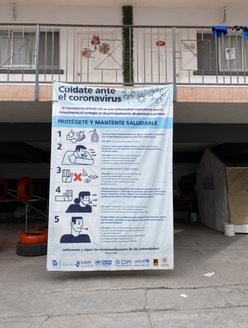
The IRC provides case management, humanitarian reception, and legal assistance to tens of thousands of asylum seekers, unaccompanied children, and other vulnerable people seeking protection in the U.S. each year. We have worked with partners to provide over 26,000 individuals with emergency humanitarian reception services at our Phoenix Welcome Center in 2021 alone. We are also working with partners to respond to asylum seekers’ urgent needs and to provide free legal assistance to migrants facing deportation.
In Mexico, the IRC is responding along the main migration corridors: from the southern to the northern borders and in Mexico City. The IRC’s programs offer a timely and comprehensive response to the most urgent needs of people on the move, including: prevention and response to gender-based violence; access to critical information through InfoDigna, a multi-channel information platform; prevention and mitigation of COVID-19; economic recovery and development; child protection services; cultural orientation for individuals that have chosen to stay in Mexico; as well as identifying needs and referring cases to local service providers. Additionally, the IRC launched a response to support Afghan evacuees arriving in the country's capital.
In northern Central America, the IRC is supporting individuals and families in vulnerable situations or at increased risk for violence and displacement. The IRC’s programming includes multi-purpose cash transfers to satisfy basic needs; the creation of safe spaces for women, youth and the LGBTQ+ community; case management and psychosocial support; and CuéntaNos, a digital platform—part of the Global Signpost project—to provide people with critical, up-to-date information and two-way communication and support with trained moderators.
In Haiti, the IRC is supporting the critical work of local Haitian organizations FOSREF, Kay Fanm and FADHRIS to aid the recovery efforts from the earthquake and Hurricane Grace.
How can I help asylum seekers?
Donate to help the IRC provide critical aid to refugees and asylum seekers worldwide.
A new bill introduced in the Senate would prevent the Biden Administration from ending the policy, known as Title 42, that denies people at the U.S.-Mexico border their legal right to asylum. Take action today to tell your senators to oppose this harmful legislation.
Share this article with your friends and family on Facebook or Twitter to remind them that seeking asylum is a right.